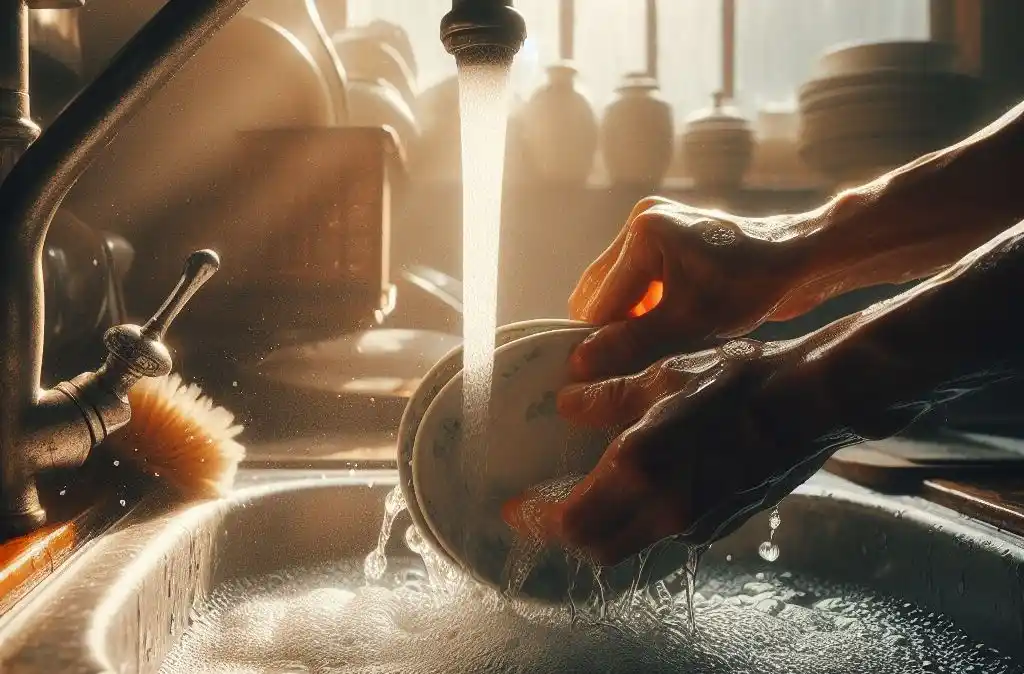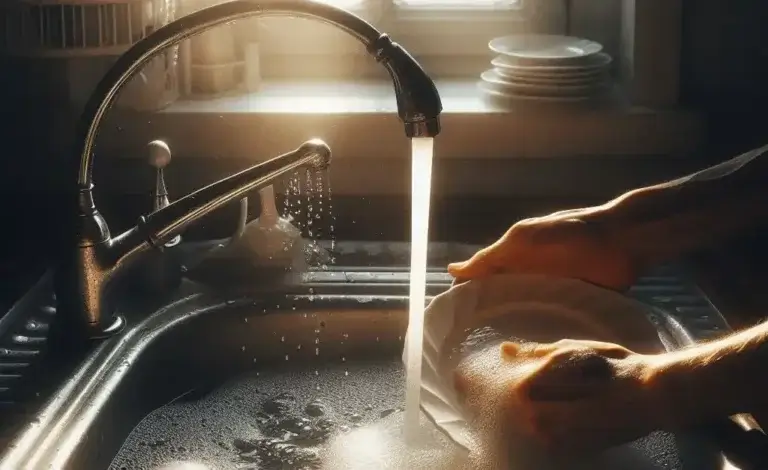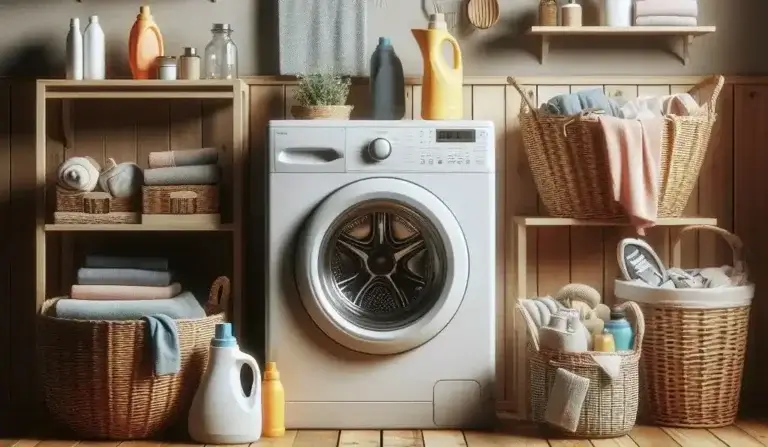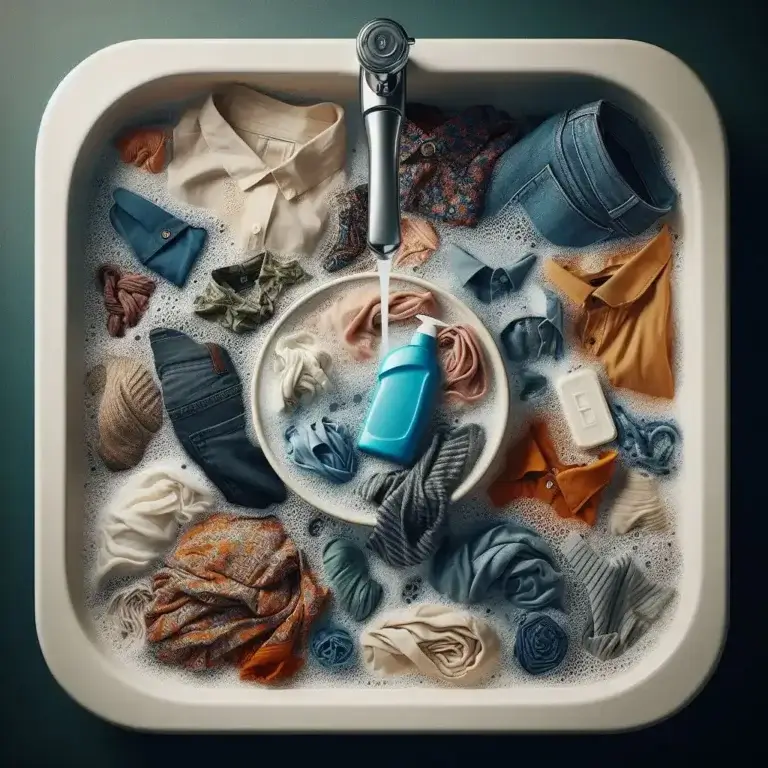Can I Use Shampoo to Wash Dishes? The Surprising Substitute
Have you ever wondered if shampoo can clean dishes? When your dish soap runs out, that bottle of strawberry kiwi shampoo seems tempting. But is it an effective dishwashing substitute?
We’ll explore whether can i use shampoo to wash dishes, mirrors, cars, and more. You’ll discover:
- Can shampoo wash dishes?
- Dishwashing soap vs. shampoo ingredients
- Step-by-step: Washing dishes with shampoo
- 6 unexpected uses for shampoo
- FAQs on shampoo as a cleaning agent
Let’s sum up and learn why shampoo falls short on greasy pots and pans.
Table of Contents
Can Shampoo Clean Dirty Dishes?
Shampoo makes a lot of suds and seems like it could wash dishes. But looks can be deceiving. Shampoo lacks grease-cutting power so it can’t effectively clean dishes. Leaving residue risks also make it less than ideal.
Dish soap contains degreasers like salts of fatty acids to penetrate oil and food grease. Shampoo’s mild cleaning agents can’t power through and dissolve residue. It leaves behind soap scum and food bits.
You can use shampoo to wash dishes without dish soap. But be prepared to scrub a lot more and rinse thoroughly after. Stick to formulated dish soaps for cleaning dishes without hassle.
Now let’s explore why shampoo falls short when cleaning…
Dish Soap vs Shampoo: Why Ingredients Matter
Shampoo and dish soap have very different ingredient formulas. Dish cleaning requires harsher detergents. Gentler hair cleansing needs milder surfactants.
Dish Soap Grease Busters
Dish soap leverages strong degreasers to cut through food grime like oil, cheese, and sauces. Common active ingredients include:
- Lye – Removes tough burned or baked-on food
- Linear alkylbenzene sulfonates – Penetrate and dissolve greasy build-up
- Alcohol ethoxylates – Cut through sticky oils and fats
- Salt of fatty acids – Emulsify and break food films
Combined, these harsh detergents bind to and eliminate residue without scrubbing or effort.
Gentler Shampoo Surfactants
On the other hand, shampoo contains mild surfactants to gently cleanse hair without stripping it. Key ingredients include:
- Cocamidopropyl betaine – Cleans by lowering the surface tension of water
- Sodium laureth sulfate – Foams to lift away sebum and environmental debris
- Coco-glucoside – Nonionic oil-in-water emulsifier derived from coconut oil
- Dimethicone – Conditions to leave hair shiny and smooth
The shampoo is formulated for delicates – not dishes caked with marinara sauce! The gentle surfactants simply can’t penetrate and remove greasy grime.
Washing Dishes With Shampoo: Step-by-Step
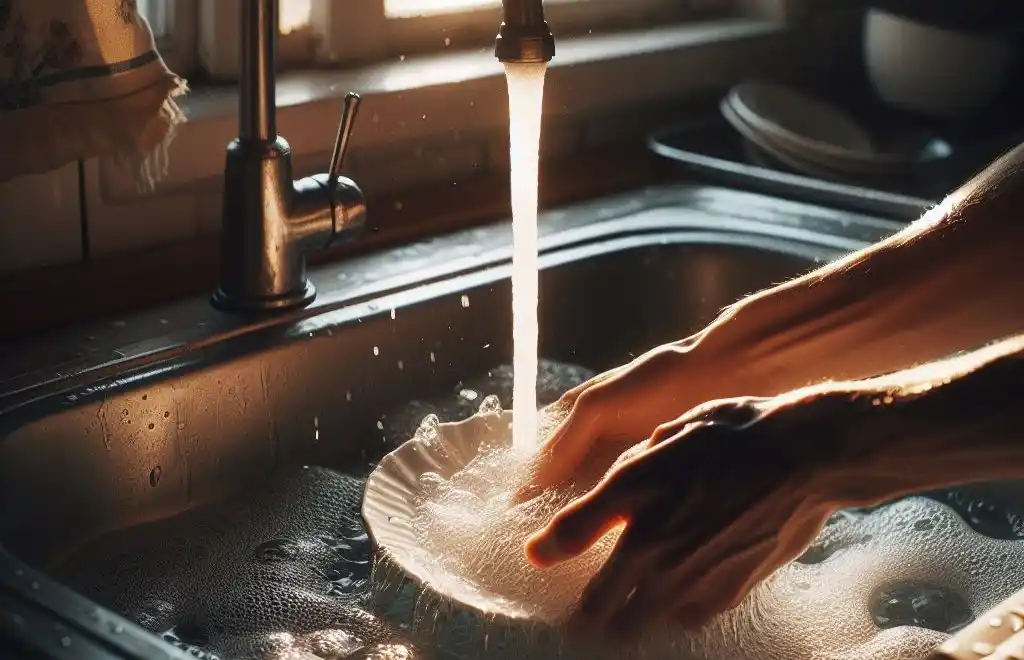
Stuck without dish soap? Here’s how to wash dishes with shampoo:
Supplies Needed
- Shampoo
- Large bowl
- Warm water
- Dish sponge & brush
- Drying rack
Instructions
- Fill a bowl with warm water and swirl in a palm-full of shampoo until sudsy
- Soak grimy dishes for 10-15 minutes to loosen baked-on residue
- Scrub dishes with a sponge or brush, applying pressure to remove films
- Rinse thoroughly with hot water – at least 2 full minutes
- Allow dishes to fully air dry in the rack before re-using
Be prepared for some elbow grease scrubbing. Always rinse thoroughly after to remove shampoo residue.
While it works…stick to formulated dish soaps like Dawn Platinum Powerwash for easier cleaning.
Can I Use Shampoo to Wash Dishes – Solution

Washing dishes is a daily chore, and we’ve all faced the dreaded situation of running out of dish soap. In a pinch, you might wonder, “Can I use shampoo to wash dishes?” While it’s tempting to reach for whatever sudsy solution you have on hand, there are some important things to consider before using shampoo on your dirty dishes.
Addressing User Concerns:
- Safety: Shampoo is formulated for hair, not dishes. While it won’t cause immediate harm, shampoo may not effectively remove grease and food residue, leaving your dishes inadequately sanitized. Additionally, some shampoo ingredients, like fragrances and conditioners, can leave a lingering taste or film on your dishes, making them unsafe for consumption.
- Effectiveness: Dish soap is specifically designed to cut through grease and grime, while shampoo is meant to cleanse and condition hair. Shampoo may not be strong enough to tackle tough food stains, leaving your dishes feeling greasy and unclean.
- Cost: Using shampoo for dishes is not cost-effective in the long run. Even a small amount of dish soap can last much longer than the same amount of shampoo, making it the more economical choice.
Alternatives to Shampoo:
- Baking soda and vinegar: This classic cleaning duo is surprisingly effective at removing grease and grime. Simply sprinkle baking soda on your dishes, spray with vinegar, and let the mixture fizz before scrubbing and rinsing.
- Lemon juice: The acidity of lemon juice can help cut through grease and add a fresh scent. Squeeze some lemon juice directly onto your dishes or mix it with water for a DIY cleaning solution.
- Salt: Similar to baking soda, salt can be used to scrub away stubborn food particles.
While using shampoo in a pinch may seem like a viable option, it’s not the best or safest solution for washing dishes. Dish soap is formulated specifically for the task and will do a much better job of cleaning and sanitizing your dishes. Remember, your health and the cleanliness of your dishes are paramount, so it’s always best to stick with dedicated dishwashing products.
Call to Action:
- Stock up on dish soap to avoid future emergencies.
- Explore eco-friendly and natural dishwashing options.
- Share your own favorite dishwashing tips and tricks in the comments below!
6 Surprising Uses for Shampoo Beyond Hair
Shampoo makes a decent cleaning pinch hitter for things besides dishes. The sudsy texture tackles household messes like:
Washing cars – Gently lifts dirt without stripping wax like harsh car wash soaps
Cleaning delicates – Removes stains on silks, lace and fine fabrics without fading
Unfogging mirrors – Apply shampoo and wipe with a soft cloth for streak-free clarity
So before you wash that dirty load of laundry with shampoo…consider Caveman levels of cleaning convenience with formulated detergents instead!
More Useful Shampoo Hacks
Beyond car waxing and mirrors, shampoo can also be used to:
- Shave legs and armpits
- Wash fruits and vegetables
- Clean makeup brushes
- Wash pets like dogs and cats
The mild Formula leaves surfaces fresh and clean without damage. (Just not dishes!)
What Can I Use to Wash Dishes Instead of Dish Soap
If you’re in a pinch without dish soap, fret not! Several natural and readily available options can handle your dishwashing needs. Here are some effective alternatives:
Natural Scouring Agents:
- Baking soda: A gentle abrasive that cuts through grease and food residue. Sprinkle it on a damp sponge or directly on the dish, scrub, and rinse.
- Salt: Similar to baking soda, salt works well for scrubbing away stuck-on food particles. Use coarse salt for extra abrasiveness.
- Citrus peels: Rub lemon, orange, or grapefruit peels on greasy dishes to remove oil and add a fresh scent.
Acidic Solutions:
- Vinegar: The acidity of vinegar cuts through grime and grease. Dilute white vinegar with water (1:1 ratio) and use it as a cleaning solution or soak dishes in it for tougher messes.
- Lemon juice: Another acidic friend, lemon juice works like vinegar and adds a natural shine to dishes.
Combination Alternatives:
- Baking soda + vinegar: The ultimate dynamic duo! Sprinkle baking soda on the dish, spray with vinegar, and let it fizz before scrubbing and rinsing.
- Salt + lemon juice: Mix salt with lemon juice to create a paste for tackling stubborn stains. Scrub, then rinse thoroughly.
Additional Tips:
- Hot water: Use hot water with any of these alternatives for enhanced cleaning power.
- Dishcloths and sponges: Choose naturally abrasive materials like cotton or bamboo dishcloths and sponges for efficient scrubbing.
- Heavy-duty messes: For particularly greasy or baked-on messes, consider pre-soaking the dishes in hot water before trying any of these alternatives.
Remember, while these alternatives can work in a pinch, they may not be as effective as dish soap, especially for sanitizing. If regular dishwashing is your routine, consider stocking up on eco-friendly or natural dish soap to avoid future emergencies.
Can I Use Body Wash to Wash Dishes
It’s tempting to reach for the nearest sudsy solution when you’re out of dish soap, but using body wash to clean your dishes isn’t ideal. While it might create some bubbles and remove light messes, there are several downsides to consider:
1. Ineffectiveness against grease and grime: Dish soap is specifically formulated to cut through grease and food residue, while body wash is designed for gentler cleansing of skin.
Body wash may not be strong enough to tackle greasy dishes effectively, leaving a film behind that could harbor bacteria.
2. Potential safety concerns: Body wash often contains ingredients like fragrances, dyes, and moisturizing agents that are not meant for consumption.
These ingredients can leave a lingering taste or film on your dishes, potentially contaminating your food and posing health risks.
3. Higher cost and lower efficiency: Compared to dish soap, body wash is generally more expensive and less concentrated. You’d need to use a larger amount to achieve the same cleaning power, making it less cost-effective in the long run.
4. Environmental impact: Using body wash for dishes can contribute to increased wastewater pollution as the ingredients are not designed for food contact and may not break down easily in treatment plants.
Alternatives to consider:
If you’re caught in a dish soap bind, here are some safer and more effective alternatives:
- Baking soda: A natural abrasive that cuts through grease and food residue. Sprinkle it on a damp sponge or directly on the dish, scrub, and rinse.
- Vinegar: The acidity of vinegar cuts through grime and grease. Dilute white vinegar with water (1:1 ratio) and use it as a cleaning solution or soak dishes in it for tougher messes.
- Lemon juice: Similar to vinegar, lemon juice works well and adds a natural shine to dishes.
- Salt: Use coarse salt for scrubbing away stuck-on food particles.
Remember, while these alternatives can work in a pinch, they may not be as effective as dish soap, especially for sanitizing. If regular dishwashing is your routine, consider stocking up on eco-friendly or natural dish soap to avoid future emergencies.
I hope this clarifies why using body wash for dishes isn’t the best idea and provides you with some helpful alternatives!
FAQs: Using Shampoo to Clean Dishes
Still, have some soapy questions? Here are answers to common shampoo cleaning queries:
Does shampoo work in the dishwasher?
No! Only use designated dishwasher detergents in your machine. Shampoo can cause excess suds and damage.
How long should you rinse shampoo off dishes?
Rinse dishes for at least 2 full minutes under very hot water. This ensures no shampoo residue remains which can be unsafe if ingested.
Can you remove baked or dried food with shampoo?
Tough baked-on or dried food is difficult to remove with shampoo alone. You’ll need to soak and then scrub vigorously to attempt to lift the residue.
Is shampoo scratching my glassware?
No – shampoo is gentle enough for hair and won’t scratch or damage dishes. Just beware of abrasive scouring pads which can leave scratches.
Don’t Depend on Shampoo For Dishes
While you can use shampoo in a pinch, it’s a lackluster dish soap. For easy, residue-free cleaning:
- Stick to formulated dish soaps like Dawn Ultra
- Always rinse thoroughly after to avoid ingesting shampoo
- Consider alternate shampoo cleaning uses for cars, pets, and mirrors instead
Next time you run out of dish soap – make grabbing a new bottle top priority! Don’t reach for household shampoo bottles as anything more than a last resort.
I hope this helped explain why shampoo falls short on pot and pan cleaning! Let me know if you have any other sudsy substitution questions.

